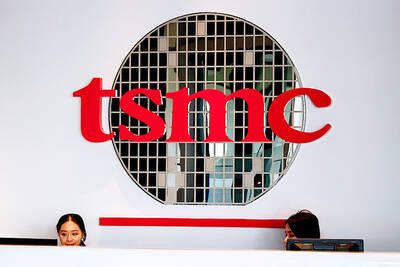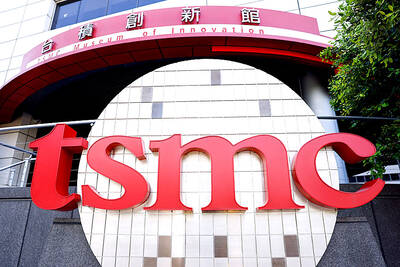By improving shuttle bus services and adding variety to the ticket, Taiwan High Speed Rail Corp (THSRC,
"Revenue for the entire year should reach NT$30 billion [US$929.5 million]. Our goal is to at least double the number of passengers," THSRC chief executive officer Ou Chin-der (歐晉德) said in a press conference celebrating the company's first year of operations yesterday.
Ou said that balance between monthly income and overhead would be attained by the end of this year.
In its first year, the company made revenues of NT$14 billion, with 15.79 million tickets sold.
The company said that its punctuality rate of 99 percent -- or delays averaging 0.27 minutes -- was better than that of Japan's Shinkansen, the Eurostar and the TGV in France.
Statistics released by the THSRC showed that the frequency of trains between Taipei and Kaohsiung had increased from 38 round trips in the first week of operation to 126 by the end of last year, with an average occupancy of 44.72 percent.
The company hopes to boost that percentage to 60 and the number of runs to 176 by December.
A survey by the Ministry of Transportation and Communications (MOTC) in September showed that 28.7 percent of occupants used the THSRC for business purposes, 26 percent to visit relatives, 22.7 percent for tourism, while 19.6 percent had only taken the train out of curiosity.
"Our aim is to win over people who still choose to drive their car on weekends or holidays and increase people's curiosity and confidence in the high-speed train," Ricardo Tan (
MOTC statistics showed that since the THSRC's first day of operation on Jan. 5 last year, passengers who took the airplane and traditional railways for trips within the country had both dropped by more than 10 percentage points, while those who took long-distance buses had declined 6 percent as of the end of September.
The percentage of people who choose to drive remained unchanged, at 21.4 percent.
In addition to plans to increase shuttle bus services at Taoyuan, Hsinchu, Chiayi and Tainan, and improvements in links to city centers in Taichung and Kaohsiung, the company intends to launch a multiple-entry pass this year, Ou said.
The first-come, first-served seating in selected compartments introduced in November as a pilot marketing scheme will become a regular service, he said.
Discounts for off-peak rides and package deals for small tourist groups are also on the drawing board, in a bid to widen the customer base and push up loading rates, Ou said.
Although the company was optimistic over its business prospects, Ou said that listing on the the Taiwan Stock Exchange remained a long-term goal.
THSRC trades on the Emerging Stock Market (
The company's shares closed 0.59 percent lower at NT$8.4 yesterday.
Ou said foreign investors had expressed an interest in offering new loans to THSRC to help reduce interest costs.
He declined to identify the interested parties.
The company's outstanding liability totaled NT$377.16 billion as of June 30, the company said.

Chizuko Kimura has become the first female sushi chef in the world to win a Michelin star, fulfilling a promise she made to her dying husband to continue his legacy. The 54-year-old Japanese chef regained the Michelin star her late husband, Shunei Kimura, won three years ago for their Sushi Shunei restaurant in Paris. For Shunei Kimura, the star was a dream come true. However, the joy was short-lived. He died from cancer just three months later in June 2022. He was 65. The following year, the restaurant in the heart of Montmartre lost its star rating. Chizuko Kimura insisted that the new star is still down

While China’s leaders use their economic and political might to fight US President Donald Trump’s trade war “to the end,” its army of social media soldiers are embarking on a more humorous campaign online. Trump’s tariff blitz has seen Washington and Beijing impose eye-watering duties on imports from the other, fanning a standoff between the economic superpowers that has sparked global recession fears and sent markets into a tailspin. Trump says his policy is a response to years of being “ripped off” by other countries and aims to bring manufacturing to the US, forcing companies to employ US workers. However, China’s online warriors

Taiwan Semiconductor Manufacturing Co (TSMC, 台積電) listed the challenges of ensuring export control compliance by its customers, months after the company’s artificial intelligence (AI) silicon was found to have flowed to US-sanctioned Huawei Technologies Co (華為) via intermediaries. “TSMC’s role in the semiconductor supply chain inherently limits its visibility and information available to it regarding the downstream use or user of final products that incorporate semiconductors manufactured by it,” the Hsinchu-based company said in its latest annual report released on Friday. The world’s largest contract chipmaker said the constraint impedes its ability to prevent unintended end-uses of its semiconductors, as well

Taiwan Semiconductor Manufacturing Co (TSMC, 台積電) expects steady growth this year despite global economic uncertainty due to continued momentum from tech trends such as 5G, artificial intelligence (AI) and high-performance computing (HPC) applications. In the company’s annual shareholders’ report released on Thursday, TSMC chairman and CEO C.C. Wei (魏哲家) said the company is well-positioned to meet market demand with its differentiated technology platforms. The company’s 2-nanometer process is on track for volume production in the second half of this year, while its next-generation nanosheet-based A16 process, aimed at HPC applications, is scheduled for mass production late next year, Wei said. Advanced technologies —